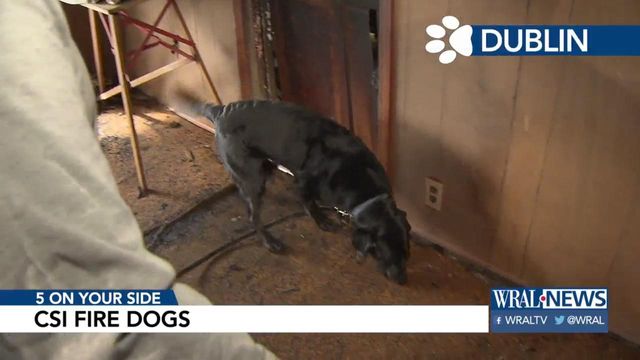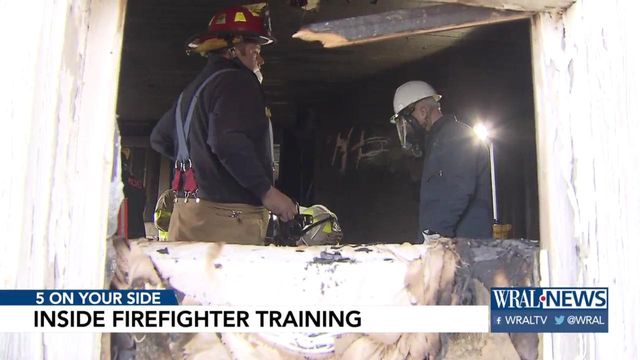Intentional fires give human, dog investigators real-world training
Fire set intentionally serve a critical purpose. They offer a chance for training - for firefighters to beat down the flames, and for investigators both human and canine to get to the source of the blaze.
Posted — UpdatedFire set intentionally serve a critical purpose. They offer a chance for training – for firefighters to beat down the flames, and for investigators both human and canine to get to the source of the blaze.
5 On Your Side tagged along for a behind-the-scenes experience of this unique and impressive training that involved firefighters and investigators from across the state, officers from the State Bureau of Investigation and even federal agents.
Over the course of the two days, they set nine fires in all at a donated, furnished home in Johnston County.
Ryan Parker, deputy fire marshal for Johnston County Emergency Services, said there is no training like the real thing.
"You understand how to attack the fire, the different flow path, how air moves trough the structure, how the fire is going to move throughout the structure," he said.
For student investigators, it is a chance to practice pinpointing the differences between accidental and arson.
Greensboro firefighter Nick Jackson was among those working to become a certified investigator.
"I don't do this full-time, so it's important for me to get a little better handle on it, and there's a lot to it," he said.
Tyler Moore, a field training specialist with the State Fire Marshall's Office said, "This is extremely important because this gives us the most realistic training that they can get."
He pointed out to Jackson and others where the glass was pushed out just a bit.
"You should be taking photos of all of this," he told the trainees. They take pictures, get measurements and pay attention to everything happening around them, including the color and thickness of smoke.
"There's a lot of things that are destroyed during a fire, so there's a lot of evidence that does get destroyed," Moore said.
Dogs play big role in fire investigations
As they investigate some of these humans will share the load with canine companions. After all, a dog's nose can lead to scents a human nose would never find.
Three awesome dogs participated in the recent training event in Johnston County. Kiara, Camden and Dublin took turns to detect accelerants inside a burned house.
Kevin Oliver, a criminal specialist with the State Bureau of Investigation, is Dublin's handler.
He said, "These dogs are trained to go into the fire scenes after they've been put out and sniff if there has been some kind of ignitable liquid used such as gas, diesel, kerosene, those kind of things."
Oliver said dogs, with a sense of scent 100,000 times sharper than a human's, can track down in minutes a scent it could take a human days to discover.
"I have had dogs in the past to alert in scenes weeks later, or they would pick up at such low amounts that you would never imagine that they would be able to pick it up," he said.
At the training event, Camden tracked down the scent of half a thimble of gasoline left on a piece of foam days earlier.
Camden and Dublin are even considered certified federal agents with the Bureau of Alcohol, Tobacco, Firearms and Explosives. Oliver said that means they go anywhere across the country where their skills are needed.
Most of detection dogs usually work until they're about 10 years old, then they retire. Most continue living with their handlers.
Related Topics
• Credits
Copyright 2024 by Capitol Broadcasting Company. All rights reserved. This material may not be published, broadcast, rewritten or redistributed.






